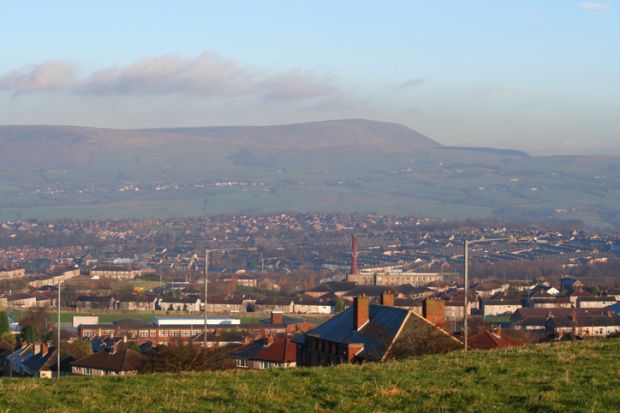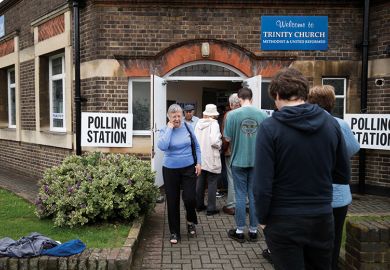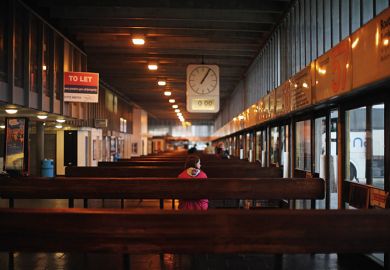The theory that education, not social class, is now the defining divide in UK politics got another boost from the Conservatives’ general election victory. Will Jennings, professor of political science and public policy at the University of Southampton, produced analysis for Sky News’ election night coverage showing the Conservative vote increasing most sharply in areas with low numbers of graduates and the Labour vote collapsing most in those areas.
“This partly reflects the greater propensity for younger people to also have higher levels of education than older generations, but also generational differences in values and identities – on issues such as Brexit and climate change,” he wrote, describing education as “perhaps the foremost factor behind [the] realignment of British politics”.
As Jennings, a co-founder of the Centre for Towns thinktank, told me shortly before the election, the geographical distribution of graduates is electorally significant: deindustrialised towns in the Midlands and North where the Tories won the election – with their ageing, largely non-graduate populations – “have been drifting away from Labour” for many years. While higher education expansion has created a large, cohesive, socially liberal group of graduate voters, an inverse group of socially conservative non-graduate voters also appears to have developed a common political identity.
The drift of towns away from Labour became more like a surge at this election and there are some policy and broader cultural implications from this for universities.
The new Conservative government’s electoral support base is increasingly non-graduate (already at the 2017 election, 32 per cent of graduates voted Conservative while 48 per cent voted Labour). If Tory education policy is formed at least partly on the basis of electoral calculation, then they have every reason to accentuate the turn they started before the election – away from faith in university expansion towards the further and vocational education regarded (fairly or unfairly) as more of a priority for town voters.
This is the context in which to read the Tory manifesto’s pledge to “consider carefully” the Augar review’s “thoughtful recommendations” on “the balance of funding between universities, further education and apprenticeships and adult learning”.
The manifesto was intensely sceptical about the value of higher education in its expanded form, notably pledging to “tackle the problem of…low-quality courses”. The shifting Tory electoral base gives an impetus to those in the party who already had concerns in this field.
It is notable that the Conservative thinktank that has been driving much of the agenda around “low value HE”, Onward, has also been a prominent voice urging the Tories to target socially conservative voters in traditionally Labour, Leave-voting constituencies, through its Workington Man concept/caricature.
In an alignment between economic critique and cultural attack that ought to worry universities, the manifesto also pledged to “strengthen academic freedom and free speech in universities”. The manifesto was co-authored by Munira Mirza, a former writer for the website Spiked who accused some academics of suppressing intellectual freedom in a Daily Telegraph article earlier this year, and this commitment to unspecified government action around free speech chimes with her interests.
Some on the cultural right of the Conservative Party would relish a full-on, US-style culture war against universities over their supposed “left-wing bias” – which would come without political cost for an overtly right-wing populist Tory government seeking to pamper its non-graduate support.
But if the Conservatives were to discover a genuine interest in place-based policies designed to improve the lives of voters in deindustrialised towns, there is a potential role for universities here. The manifesto pledged to “strengthen universities and colleges’ civic role” (its other co-author was Rachel Wolf, who wrote the recent Civic University Commission in her role as a partner at political consultancy Public First).
Jennings previously told THE that the civic university agenda should look at what forms universities can take “that might allow them to engage in communities in towns” and “what forms might level up some of the educational inequalities”. Lord Kerslake, who chaired the Civic University Commission and is now leading the UK2070 Commission on regional inequality, has offered a similar message, suggesting as a role model Sheffield Hallam University’s South Yorkshire Futures programme, which aims to raise school attainment not just in Sheffield but across the towns of Barnsley, Doncaster and Rotherham.
There are a lot of potentially damaging consequences for our society if it becomes polarised between graduates and non-graduates, between cities and towns. Place, and somehow trying to play a role in addressing those divides, should be a focus for universities.
But that won’t stamp out all the other fuses lit in the Conservative manifesto. As liberal institutions on the non-Tory side of those graduate/non-graduate, metropolitan/town divides – and as institutions that benefited from a 2012 funding settlement perceived by many in government as generous and failed – universities risk looking like an easy target for a free shot from their economic and cultural critics in the party.
John Morgan is deputy news editor at Times Higher Education.
Listen: John Morgan and Simon Baker discuss what the election results mean for HE
Register to continue
Why register?
- Registration is free and only takes a moment
- Once registered, you can read 3 articles a month
- Sign up for our newsletter
Subscribe
Or subscribe for unlimited access to:
- Unlimited access to news, views, insights & reviews
- Digital editions
- Digital access to THE’s university and college rankings analysis
Already registered or a current subscriber?




